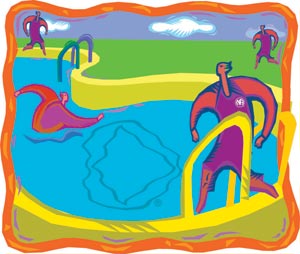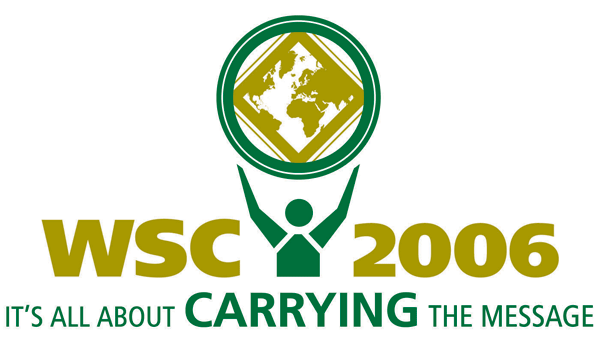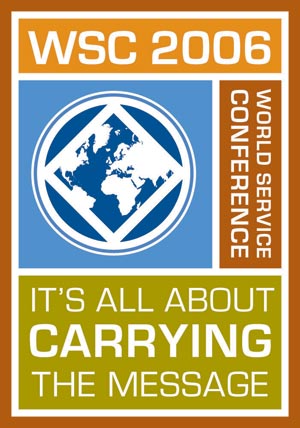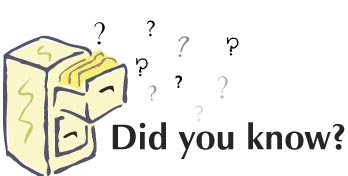Service - It's all about carrying the message
|
OK…
everybody in the pool!
We mean the World Pool—a database of NA
members and their specific skills, from which candidates are
chosen for NA World Services positions and projects. Joining
the World Pool is how an NA member makes known his or her
willingness to be an NA World Services trusted servant, and
a way to become involved on workgroups that complete
specific projects. |
 |
|
“I perform
service with NA members from all over the world.
This causes me to think not only of the region
where I live, but about NA as a whole and what I
can do to help.”
“If you think you
don’t have skills that might benefit NA World
Services, my suggestion is this: Fill out the
WPIF and send it in. Let your Higher Power do
the rest. You might be amazed at what you end up
doing.”
“I didn’t want
to commit to something I couldn’t live up to,
but I found out that if I was contacted to work
on a project and I had a conflict, all I had to
do was explain my other obligations.” |
|
The NAWS body responsible for managing the
World Pool is the Human Resource Panel. For a complete
picture of what the HRP is, we encourage you to read A
Guide to World Services in NA. To give you a general
idea, here is a brief description of the HRP’s primary
purposes and functions:
-
Brings
together a pool of trusted servants willing and
qualified to serve on the World Board, the WSC
co-facilitator positions, the HRP, and workgroup
projects
-
Facilitates
the process of selecting among candidates interested in
being involved in NAWS
-
Facilitates
elections at the World Service Conference
-
Utilizes all
resources and creates a process that can be understood
Are you ready to jump into the pool yet? It’s easy! If you
have five or more years clean, simply complete a World Pool
Information Form. This is the way to express your
willingness to be involved in NA World Services. The number
of open NA World Services trusted servant positions is
limited, and new projects only come along every two years,
so please don’t be discouraged if you are not called
immediately after turning in your WPIF. Part of the World
Pool commitment is just making yourself available.
For more information, contact us by mail or
on the web at:
HRP
NAWS Inc.
PO Box 9999
Van Nuys, CA 91409
818.773.9999
or email us at:
hrp@na.org
Ready to complete your WPIF?
Access it directly at:
www.na.org/HRP/hrp-wpif-pt1.asp |
|

CAR Parts:
Discussion questions from your World Board
Some of you—in fact, we hope most of you—may
know that we are now in what NA World Services calls
conference season. The World Service Conference will be held
23–29 April 2006, and in preparation, members around the
world are reading and talking about the Conference Agenda
Report. Once upon a time, we wouldn’t be making much, if
any, mention of the CAR here in The NA Way Magazine.
In the past, the gap between the content of The NA Way
and the content of the Conference Agenda Report
could be pretty wide.
This article is a testimony, then, to our
efforts to make the Conference Agenda Report—and the
work of the conference overall—more relevant to the
fellowship as a whole. This year’s CAR is focused on the
issue discussion topics and projects. There are only a few
motions in this year’s CAR, but there are discussion
questions for each topic and for some potential projects.
Among the things we have determined to be important to work
on in the years ahead are targeted literature and basic
tools for groups, areas, and regions. We invite you to read
about the topics and projects in the report (which can be
downloaded from
www.na.org/conference), and to consider these questions
in your groups and service bodies.
Issue Discussion Topics
Atmosphere of Recovery
-
Who, from your local community, is
missing from your group, and why do you think they might
be missing? (For example, if you live in a racially
diverse community, do the people attending your meeting
reflect that diversity?)
-
What are some things that you can do as
an individual to create and maintain the atmosphere of
recovery in your home group? (For example, greet someone
you don’t recognize; make a commitment to listen while
each person is sharing and not participate in side
conversations; etc.)
-
What are some of the things the group
can do? (For example, change the room setup so it’s more
conducive to an atmosphere of recovery; acknowledge
newcomers in some way—with phone lists or introductions;
etc.)
Leadership
-
How can we instill a sense of personal
responsibility, ownership, and stewardship for the roles
we take on?
-
What do we mean when we refer to
“leadership” in NA? What is the difference between
“leaders” and “leadership”?
Our Public Image
-
How do I take responsibility for NA’s
image/reputation? How do service bodies do so? How can a
sense of personal responsibility and ownership develop
in me, and how can I help others develop this?
-
What about our image/reputation makes
some people believe NA is not appropriate for them? What
about our image makes some people believe NA is not
where they would refer a client?
Infrastructure
-
What are we trying to accomplish (what
is most needed in your community) and how can we best
meet those needs (how is the service structure meeting
those needs)? What are the underlying principles
involved, and what is the basic minimum structure
required?
-
What can I do to make service more
effective? Why should I be of service?
Targeted literature and basic tools |
|
Targeted Literature
Does the list below reflect our top needs
for targeted literature? What can you think of that should
be on this list that is not?
Priority (not necessarily in order)
-
youth and recovery
-
medication and recovery
Second ranking (not necessarily in order)
-
the benefit of service to personal
recovery
-
the spiritual development of members
with longer cleantime, and how to continue to engage
them in the fellowship of Narcotics Anonymous
Third ranking (not necessarily in order)
|
 |
|
Basic tools for groups, areas, and regions
Does the list below reflect our top
priorities for tools to create or revise? What can you think
of that should be on this list that is not?
-
• Updateable materials that cover group
trusted servant roles and responsibilities and how to
carry them out
-
• Discussion tools for running certain
types of meetings
-
• Simple, interactive tools (with more
contemporary packaging) for leaders to use to increase
member understanding and practice of the principles,
including the “why”s and concepts (in both a generic,
and a capital “C,” sense) of service
-
• Puzzle of the components of the
service structure
|
|
Our public image is each member’s
responsibility
Amidst the great success of WCNA-31, we did
witness some unfortunate encounters with our members. If
this was a one-time experience, it would not be noteworthy;
however, we are seeing a pattern developing. Some NA members
seem to harbor an inexplicable attitude of entitlement that
causes them to behave in ways that do not reflect positively
on our fellowship.
At WCNA-31, there were two physical
altercations in which NA members actually pushed convention
center staff and each other because they didn’t have the
patience to wait in line to enter a meeting or event. We
also observed NA members handling hotel billing or service
disputes by shouting and using obscene language at the hotel
front desk—with everyone in the lobby observing this
behavior. Because of these encounters, the impression many
people in Hawaii have of NA is that our members are
inappropriate, rude, and physically aggressive.
First impressions are the most long-lasting
for many people, and the most difficult to dispel. Whether
we are attending an NA convention, conducting an H&I panel,
or just gathering after a meeting, we need to consider that
we only have one chance to make a bad impression—and
everything we do contributes to the perception others have
of Narcotics Anonymous.
Which image do you think most people will
remember: the image of the governor presenting NA with a
proclamation or the image of the loud, cursing member at the
front desk of the hotel? Which would you remember the most?

|

The Fellowship of Narcotics Anonymous has come a
long way since our beginnings in 1953. We have grown
from our first meeting in Sun Valley, California,
USA, to over 33,500 weekly meetings in over 116
countries worldwide. Our history is rich with
diversity, and we want to share the facts of that
history with you—the little-known facts along with
the well-known ones. If you have interesting facts
and information about Narcotics Anonymous, send them
to us at naway@na.org
or NAWS, Attn: The NA Way Magazine; PO Box
9999; Van Nuys; CA 91409 USA. |
PR Handbook update
Thanks to everyone for input on the
second section of the Public Relations Handbook,
which was released 1 September 2005. By the end of
the review and input process on 30 November, we had
received great feedback.
The third section of the handbook
was released 1 December 2005 for a ninety-day review
and input phase. Check your area and regional
service committee mailboxes or obtain a copy at:
http://www.na.org/conference/prhb/index.htm.
This section includes:
-
Technology
-
Event Planning
-
Fellowship Development
-
Government
-
Area Planning Tool
Approval form drafts of chapters 1-9
(sections one and two) will be released 23 January
2006 as Conference Approval Track material.
We look forward to receiving your
input!
|
|
Did you
know |
there
were 6,308 pre-registrations for WCNA-31 and 2,350
additional on-site registrations? |
|
Did you
know |
950 WCNA
beach bags filled with Hawaiian essentials were
purchased, which means:
-
3,800 ounces (more than 112 liters) of
coconut-scented after-sun lotion were available
to sooth 7,600 arms and legs, and 1,900 feet
were clad in WCNA-31 flip flops?
|
|
Did you
know |
NA World
Services staff created 139 convention posters and
banners using 1,000 linear feet (about 305 meters)
of banner material that totaled 3,600 square feet
(about 335 square meters), in addition to another 30
posters and banners produced by outside vendors
totaling approximately 2,000 square feet (almost 186
square meters)? |
|
Did you
know |
about
$0.35 of each WCNA-31 registration dollar went
toward facility expenses; $0.14 covered events
included in the registration (i.e., dances and
coffee houses); $0.08 of each dollar paid for
busing; $0.13 went to planning and implementing the
event; $0.15 per dollar was dedicated to the
program; and $0.15 covered sound and video for the
meetings and events? |
|
Did you
know |
94
locations around the world in 28 countries
telephonically linked for Unity Day 2005, which
included 16 correctional institutions and over
10,000 people “attending” this virtual meeting? |
|
Did you
know |
for the
first time in our history, WCNA included a welcoming
address from the governor of the hosting state,
Hawaii Governor Linda Lingle, who also issued a
gubernatorial proclamation declaring 1 September
2005 as the Aloha Kickoff Festival of the 31st World
Convention of Narcotics Anonymous? |
Support the vision
Part of the NA World Services Vision
Statement is:
“NA communities worldwide and NA World
Services work together in a spirit of unity and cooperation
to carry our message of recovery.”
The 1984 World Service Conference passed a
motion, “That each area be requested to hold a fundraiser
for the benefit of WSC in July of each year and send the
proceeds of such fundraiser to world services; the first to
be during July 1984.”
As you plan your 2006 events, please keep
this motion in mind; schedule an event that will help
support NA World Services and this vision of worldwide NA
unity and cooperation.
For more information, contact us at:
NAWS, Inc.
Box 9999; Van Nuys, CA 91409
818.773.9999
worldboard@na.org
|
Back to top |
![]()
